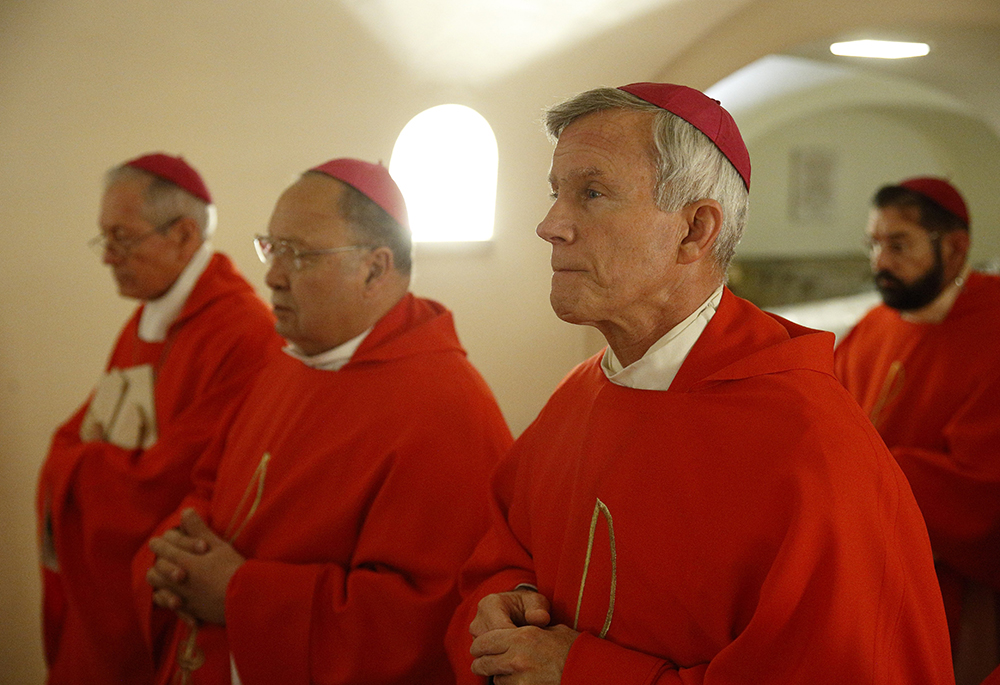
Bishop Joseph Strickland of Tyler, Texas, and other U.S. bishops concelebrate Mass in the crypt of St. Peter's Basilica Jan. 20, 2020, during their "ad limina" visits to the Vatican. The Holy See Press Office announced Nov. 11 that Pope Francis has "relieved" Bishop Strickland from the pastoral governance of the Diocese of Tyler. (OSV News/CNS file photo, Paul Haring)
My name is Briana Jansky and I am a Catholic of good standing in the Diocese of Tyler — which was, until this month, headed by Bishop Joseph Strickland. I want to share my experience being under his pastoral care as a layperson until his removal from office by Pope Francis.
This isn't a hit piece against Strickland, but this isn't an easy one to read, either. Many people won't like what I have to say, but I'm not writing it to soothe recalcitrant ears. Strickland is known for speaking boldly and calling out the hierarchy when he thinks they've gone wrong. Hopefully he can recognize the constructive criticism that comes from the laity who wish to speak boldly as well.
I should start by noting that, as a convert to the faith, I was baptized and confirmed in 2019 by Bishop Joe Vásquez in the Diocese of Austin. My parish at the time, St. Ignatius Martyr, was my introduction to the communion of the Catholic Church.
My journey into the church had left me in a state of loneliness, and God blessed me by leading me to a parish that had an incredible community. The fellowship at St. Ignatius Martyr was strong, with a foundation of unshakable unity. People from various cultures and ages loved each other, prayed for each other, lifted each other up, and welcomed each other warmly. A flock of true togetherness, it left a lasting impression on me and was the meter by which I would measure my later church experiences.
One month after first receiving the sacraments, I moved back to my hometown of Tyler, Texas, where I encountered Bishop Strickland.
When I attended my first Mass celebrated by Strickland, I noticed two distinct things about him. One was that he undoubtedly loved Jesus and was hungry to share the truth of the real presence of the Eucharist. Second, he was openly critical of the pope and the magisterium.
Watching the bishop accuse the pope of doctrinal error without a lick of proof and then pour so much love into the eucharistic Lord confused me. My sense of unity, so nurtured in my journey into the church, was ripped away as my thoughts became flooded with confusion and my mind became divided on who to believe. I was scandalized from then on, filled with anxiety about who was telling the truth and who wasn't.
I started praying daily for God to show me the truth, and slowly I started to gain clarity. One of the first such moments for me was seeing Strickland openly and flippantly tell Catholics not to worry about racism. As an African American Catholic who works hard to overcome the barrier of racism, I was angered to see him casually dismiss the issue without any accountability. Further, to see him talk about how he loved Jesus one moment, then openly support people like Fr. James Altman the next — a man who believes that lynchings were justified — angered me even more.
We are worried about the wrong “ism”. Racism is immoral & should be shunned but the root of our problems is ATHEISM. Let us repent of our sins & humbly return to God. It we do this racism & every other ill that plagues our society will fall into dust. We must address this root!
— Bishop J. Strickland (@BishStrickland) February 24, 2021
In his Good Shepherd discourse, Jesus described the phenomenon of how sheep learn the voice of their shepherd and recognize it (John 10:27). After seeing Strickland cast the issue of racism underfoot, I knew that I did not recognize his voice as my shepherd.
As time went on, the chasm only deepened. He increasingly made unsubstantiated claims against Pope Francis, pitting him against Jesus and accusing him of having a "program of undermining the Deposit of Faith." He even planted seeds of doubt about the faithfulness of the magisterium in the hearts of the lay faithful, publicly encouraging them in a pastoral letter to reject the ongoing synod on synodality. He also readily signed a document accusing the pope of teaching heresy in his 2022 apostolic letter Desiderio Desideravi.
Most recently, at the Rome Life Forum, Strickland shared and supported a sedevacantist letter that stated Pope Francis is not the "true pope" and implied that the Holy Father promotes abortion and unrepentance — despite obvious evidence to the contrary.
Now, all of this is not to say that Strickland is a complete liar and that nothing he says is true. I simply believe that he is horribly misled. He is excellent at boldly speaking up about the truths of the Catholic faith. However, weaved into these truths are insidious accusations that lack depth and credible proof. There are divisive seeds planted along with his bold proclamations, influencing Catholics to believe that everything he says is true.
Advertisement
Such behavior is contrary to Christ's call for unity, and the Catholic's obligation to be faithful to the papacy and the magisterium. Faithful Catholics who want to hear a bishop speak up about the faith will be swept away from the real tenets of the faith if they are not careful and cannot discern the false from the true in what Strickland says. And the reality is that, as time has gone on, he has continued to depart further and further from the truth. Eventually, he will drag down and lead into schism the confused Catholics who continue to rely on him for spiritual nourishment — if he hasn't already.
Such Catholics must also take into consideration that the reasons for Strickland's removal have not been released. In other words, people should not assume without any evidence that the pope hates the truth. We don't know everything. More than calling attention to the errors of Strickland's behavior, I am writing to bring awareness to Catholics who are misled into thinking that the pope is trying to usurp the church.
Yes, Strickland does speak truth. But we must carefully discern what is truth and what is not. Even Martin Luther spoke the truth about the need for reform within the church, but that only goes to show that not every shepherd is worth following.
"Do not be wise in your own eyes; fear the Lord, and turn away from evil. It will be a healing for your flesh and a refreshment for your body" (Proverbs 3:7-8).






